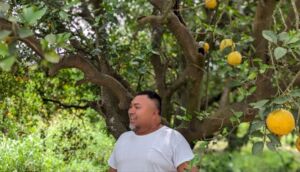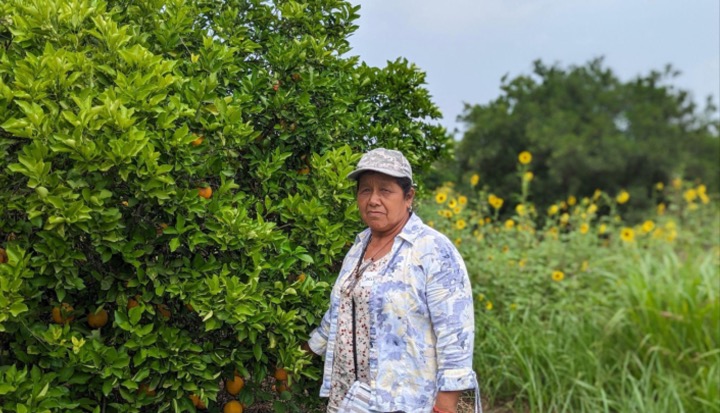From Small Farms to Formal Markets: Connecting Mexican Farmers and Buyers Through Regenerative Practices
Agriculture is a lifeline for over 8 million farmers in Mexico, with smallholders representing a significant portion of the farming landscape in the country. Small farms account for 57% of crop farms, 78% of cattle farms, 89% of pig farms, and 96% of poultry farms. On average, these small farmers contribute 19% of national agricultural production and more than half the food grown in the country.
A critical challenge identified in the latest national agricultural survey is the difficulty these farmers face in accessing reliable markets that pay fair prices and recognize the quality of their products. Formal buyers have traditionally struggled to source from smallholder farmers, and the absence of stable, profitable markets paired with erratic weather patterns has made it difficult for these smallholders to lift themselves out of poverty, invest in their farms, and adapt to climate change.
As a result of this vulnerability to changing weather patterns, the value of losses in selected crops could come to a total of almost $38,000 billion dollars nationally, which is about twice the current total national agricultural production of Mexico.
This underscores the urgency of providing smallholders with better market access and opportunities to adopt regenerative agriculture practices. In our experience at TechnoServe, we have seen that the key to doing this is identifying win-win solutions that benefit both the private sector and smallholders.
The Struggle for Fair Market Access and Climate Resilience
Consider a typical farmer growing maize, a staple food in Mexico. These farmers are grappling with rising input costs, limited access to credit, and the unpredictability of weather patterns which directly impact their productivity, profitability, and access to markets. In 2023 alone, droughts affected 40% of the country’s total cornfields. As a result, Mexico is expected to face a food deficit this year, leading to increased imports of basic products and reduced food accessibility for vulnerable communities. Smallholder farmers often lack adequate compensation to bear these risks or recover from losses. What role can the private sector play in addressing the dual challenges of supply chain efficiency, inclusiveness, and environmental sustainability?
How the Private Sector Can Promote Regenerative Agriculture
The private sector can steer positive change by establishing long-term relationships, such as stable marketing channels, which enable farmers to sell their products at competitive prices. These stable marketing channels help mitigate risks by providing consistent demand and income, thus giving farmers the economic stability they need to plan and implement regenerative practices like crop rotation, barriers or traps to stop erosion, reduced tillage, application of microorganisms, and improved irrigation systems. Such practices improve long-term farm productivity and environmental health and become more attractive when economic returns are assured through stable markets.
Furthermore, well-established channels improve the flow of information regarding market demands for sustainably produced goods, encouraging farmers to adopt practices that align with consumer preferences and environmental sustainability. This approach supports farmers’ livelihoods while at the same time aligning with the environmental goals of businesses, fostering a mutually beneficial relationship.
However, such initiatives require a business incentive for the private sector. Robust and diversified agricultural supply chains are crucial for ensuring the continuous supply of goods. Thirteen years ago, the Walmart Foundation Mexico, supported by TechnoServe as the implementing partner, launched the “Pequeno Productor” program. This initiative aims to support smallholder farmers in Mexico by increasing their productivity, quality, regenerative agriculture, and food safety standards. It also aims to develop their business capabilities to facilitate their integration into the value chain of major buyers of fruits and vegetables in the country.

Scaling beyond individual supply chains
Within the Pequeno Productor program, a complementary buyer coalition was established. This coalition directly connects buyers and farmers, reducing intermediary costs and offering stable marketing channels, thus addressing the common challenge of securing reliable suppliers that meet buyers’ quality standards. For buyers, the economic benefits include shorter supply times thanks to direct contact with producers, bypassing third parties, and facilitating a seamless flow of information and integration between the two parties. Moreover, buyers have started to recognize there are almost no cost differences between fruits produced through conventional methods and those grown using regenerative practices. Consequently, they increasingly prefer fruits that are regeneratively produced, aligning with their Sustainable Development Goals (SDG) objectives.
Initially developed as a strategy championed by the Walmart Foundation Mexico to promote a change in the ecosystem that supports the integration of smallholder farmers into formal markets, this coalition has led to tangible changes over the years. An increasing number of similar programs have emerged in the industry like the Madre Tierra program developed and supported by Danone Ecosystem, adopting this vision and further driving the transformation towards more inclusive market practices.
Measurable Success in Mexico’s Agricultural Transformation
Through the “Pequeno Productor” program, TechnoServe has trained over 32,000 smallholder farmers across Mexico, equipping them to meet quality standards and formalization requirements necessary for direct sales to formal buyers. This empowerment has enabled farmers to establish direct commercial links and secure more reliable outlets for their crops, significantly improving their incomes and quality of life. As a result, these efforts have generated over $170 million dollars in sales of fruits and vegetables for Walmart across 25 states. Additionally, the program has led farmers to transform more than 66,000 hectares into land managed under regenerative practices.
The multi-buyer coalition includes significant players like Griffith Foods, Jumex, Agrana, Altex, Danone, La Costeña, Nestlé, Elatsa, Frubana, Herdez, PepsiCo, and Walmart. This initiative has reshaped the agricultural ecosystem, with more buyers recognizing the value in sourcing from smallholder farmers and consequently increasing their purchases from the program’s participants. The next phase of these efforts involves collaborating with allies who are willing to invest financially in this transformation, recognize a strong business case, and are committed to promoting the change they wish to see in the world.
Buyer Commitments in Regenerative Sourcing
Further details on TechnoServe’s approach to engaging the private sector in the transformation towards more regenerative agricultural supply chains are available in a recent publication. This case study outlines a practical methodology for leading the regenerative transformation in agricultural supply chains by collaborating with food companies to support these initiatives. The strategies presented are designed to align economic realities with environmental sustainability, creating a viable model for widespread adoption.
Through collective efforts, the role of the private-sector-led buyer coalition is transforming Mexican agriculture, proving to be a powerful catalyst for change, providing a scalable and replicable model adaptable to different business contexts. It takes a committed partner like the Walmart Foundation in Mexico to question and act away from business as usual and experience that sustainable, inclusive agricultural practices are both good for people and the environment and beneficial for businesses.










